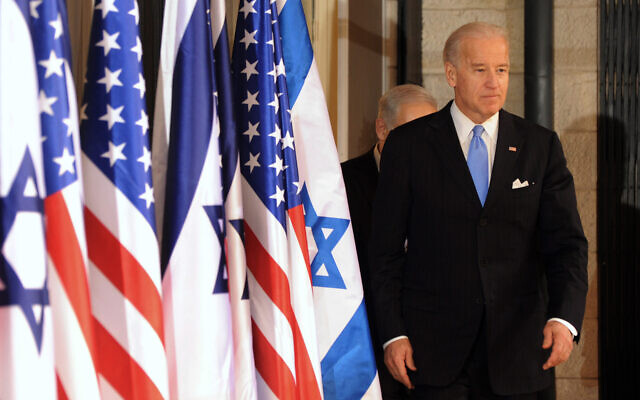Likud party officials are fretting over the increasingly likely prospect of a win for Democratic US presidential candidate Joe Biden, given that Prime Minister Benjamin Netanyahu has developed a particularly close relationship with the Republican incumbent.
Though the final results of the presidential election remain unclear, Biden appeared to be edging toward ousting Donald Trump on Thursday morning.
Speaking to Zman Yisrael, The Times of Israel’s sister site in Hebrew, on Thursday, the Likud officials warned that a loss for Trump could impact Netanyahu badly, as well as make Washington more wary of clashing with United Nations institutions on Israel’s behalf.
“Now they will tell Netanyahu: Your friend is gone, against all odds, so you will go too,” a senior Likud official said, referring to the premier’s opponents.
“Now they will talk about how Netanyahu severed ties with the Democrats, what price we will all pay and how he — who knows America better than anyone — gambled on the wrong horse,” the official said, speaking anonymously.

Then US Vice President Joe Biden on his way to speak to the press at the residence of Prime Minister Benjamin Netanyahu in Jerusalem, March 9, 2010. (AP Photo/Debbie Hill, Pool)
The fallout could also affect local politics, one cabinet minister said, telling Zman that “a Trump victory would have been a harbinger of an election [in Israel] and would have brought forward the election. Now Netanyahu will have much less desire to go to the polls in Israel.”
Trump’s recognition of Jerusalem and the Golan Heights, both of which were seen as coups for Netanyahu, came in the lead-up to the first of the trio of elections in Israel in the past two years, and the administration’s peace proposal for the Israeli-Palestinian conflict, welcomed by Netanyahu, came ahead of the third of those votes earlier this year.
Each election was indecisive and eventually the series resulted in a rickety unity government.

Israeli UN Ambassador Gilad Erdan in his New York office on October 13, 2020. (Israeli Mission to the UN)
Netanyahu, who has a strong lead in polls over his unity government partner the Blue and White party, is said by critics to be planning to engineer a coalition crisis to force new elections, which polls predict would see him return to office at the head of a right-wing bloc.
A Likud lawmaker told Zman that Israel also needs to prepare for a new reality on the international stage.
“We took a hit. Nikki Haley will not be there for us anymore,” the MK said of the former US ambassador to the UN who took particularly pro-Israel positions.
The MK, however, said that they believe Biden will not be swayed by anti-Israel sentiment.
“The Democratic Party has extreme and radical fringes, which even a left-wing government in Israel cannot get along with,” he said, but added that “Biden has a strong support base, and he is not one to be affected by them.”

US President Donald Trump, left, and Prime Minister Benjamin Netanyahu walk to a meeting in the Oval Office of the White House in Washington, January 27, 2020. (AP Photo/ Evan Vucci)
The future of Israel’s ambassador to the US would also be unclear, in the event of a Biden administration. Current ambassador Ron Dermer has close ties with the Republican Party and the Trump administration, but Likud officials doubt that he could be replaced with Israel’s envoy to the United Nations, Gilad Erdan, a former minister in Netanyahu’s government who is scheduled to take over from Dermer when the new administration is sworn in.
Likud officials are also worried that a Biden administration will abandon the Trump peace plan, which diverged significantly from the traditional two-state solution that calls for an Israeli withdrawal from the West Bank to its pre-1967 borders. Trump instead proposed Israel gaining sovereignty over its West Bank settlements and key strategic areas while the Palestinians would eventually get a state on the remaining territory. Though embraced by the Netanyahu government, the plan was categorically rejected by the Palestinians.
Netanyahu on Sunday praised Trump’s Mideast policies, even as he avoided openly taking sides ahead of the US presidential election.
The prime minister told reporters that US bipartisan support has been “one of the foundations of the American-Israeli alliance.” He went on to say “that alliance has never been stronger” and praised a slew of steps taken by Trump in favor of Israel.

Prime Minister Benjamin Netanyahu (left) meets Vice President of the United States Joe Biden in Jerusalem, 2010 (Avi Ohayun/GPO)
Despite his stated commitment to bipartisan ties with the US, Israel’s closest and most important ally, Netanyahu has frequently been seen as siding with the Republicans.
Netanyahu had a cool relationship with president Barack Obama, appeared to favor Republican challenger Mitt Romney in 2012, and then delivered a major speech to the US Congress in 2015 to argue against Obama’s emerging nuclear deal with Iran.
After taking office, Trump in 2018 unilaterally withdrew the US from the nuclear deal between Iran and world powers, winning praise from Netanyahu.
Then in August 2019, Israel banned freshman Democrat lawmakers Rashida Tlaib of Michigan and Ilhan Omar of Minnesota from touring the West Bank. In announcing the decision, Netanyahu cited a 2017 law denying entry to supporters of the Boycott, Divestment, and Sanctions movement (BDS). Though Netanyahu stressed the ban was not related to the congresswomen’s party affiliation but was rather a matter of principle, the move was widely condemned by Jewish groups in the US and Democratic lawmakers.
Related posts:
Views: 0
 RSS Feed
RSS Feed

















 November 5th, 2020
November 5th, 2020  Awake Goy
Awake Goy  Posted in
Posted in  Tags:
Tags: 
















